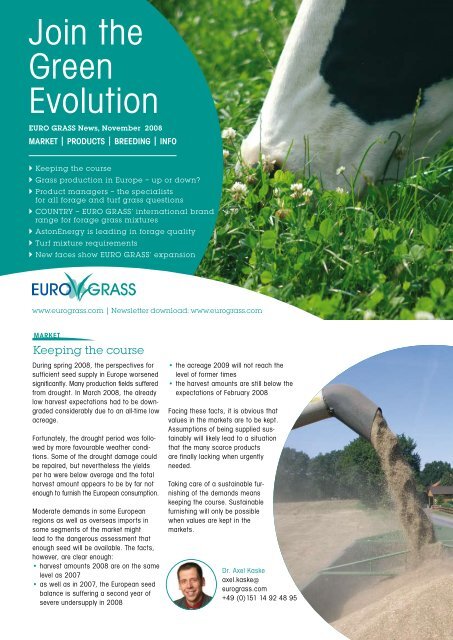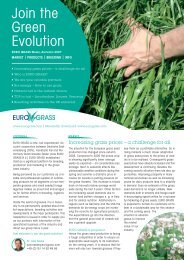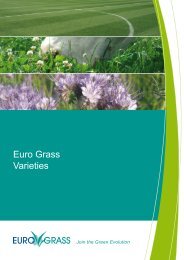Join the Green Evolution
Join the Green Evolution
Join the Green Evolution
You also want an ePaper? Increase the reach of your titles
YUMPU automatically turns print PDFs into web optimized ePapers that Google loves.
<strong>Join</strong> <strong>the</strong><br />
<strong>Green</strong><br />
<strong>Evolution</strong><br />
Euro Grass News, November 2008<br />
Market | Products | Breeding | info<br />
} Keeping <strong>the</strong> course<br />
} Grass production in Europe – up or down?<br />
} Product managers – <strong>the</strong> specialists<br />
for all forage and turf grass questions<br />
} COUNTRY – EURO GRass’ international brand<br />
range for forage grass mixtures<br />
} astonEnergy is leading in forage quality<br />
} Turf mixture requirements<br />
} New faces show EURO GRass’ expansion<br />
www.eurograss.com | Newsletter download: www.eurograss.com<br />
Market<br />
Keeping <strong>the</strong> course<br />
During spring 2008, <strong>the</strong> perspectives for<br />
sufficient seed supply in Europe worsened<br />
significantly. Many production fields suffered<br />
from drought. In March 2008, <strong>the</strong> already<br />
low harvest expectations had to be downgraded<br />
considerably due to an all-time low<br />
acreage.<br />
Fortunately, <strong>the</strong> drought period was followed<br />
by more favourable wea<strong>the</strong>r conditions.<br />
Some of <strong>the</strong> drought damage could<br />
be repaired, but never<strong>the</strong>less <strong>the</strong> yields<br />
per ha were below average and <strong>the</strong> total<br />
harvest amount appears to be by far not<br />
enough to furnish <strong>the</strong> European consumption.<br />
Moderate demands in some European<br />
regions as well as overseas imports in<br />
some segments of <strong>the</strong> market might<br />
lead to <strong>the</strong> dangerous assessment that<br />
enough seed will be available. The facts,<br />
however, are clear enough:<br />
• harvest amounts 2008 are on <strong>the</strong> same<br />
level as 2007<br />
• as well as in 2007, <strong>the</strong> European seed<br />
balance is suffering a second year of<br />
severe undersupply in 2008<br />
• <strong>the</strong> acreage 2009 will not reach <strong>the</strong><br />
level of former times<br />
• <strong>the</strong> harvest amounts are still below <strong>the</strong><br />
expectations of February 2008<br />
Facing <strong>the</strong>se facts, it is obvious that<br />
values in <strong>the</strong> markets are to be kept.<br />
Assumptions of being supplied sustainably<br />
will likely lead to a situation<br />
that <strong>the</strong> many scarce products<br />
are finally lacking when urgently<br />
needed.<br />
Taking care of a sustainable furnishing<br />
of <strong>the</strong> demands means<br />
keeping <strong>the</strong> course. Sustainable<br />
furnishing will only be possible<br />
when values are kept in <strong>the</strong><br />
markets.<br />
Dr. Axel Kaske<br />
axel.kaske@<br />
eurograss.com<br />
+49 (0)151 14 92 48 95
info<br />
Grass production in Europe – up or down?<br />
The contracting of grass and clover seeds<br />
has been very difficult <strong>the</strong> last two years.<br />
And it will continue <strong>the</strong> next year as well.<br />
Many former seed producers have changed<br />
<strong>the</strong> production into cereals or canola. There<br />
were two main reasons for this change in<br />
production. For most arable farmers <strong>the</strong> increasing<br />
prices of cereals meant that <strong>the</strong>y<br />
increased <strong>the</strong> cereals production because<br />
it was more profitable and a lot easier than<br />
seed production. And <strong>the</strong>y were right, because<br />
<strong>the</strong> profit from crop 2007 was better<br />
in cereals than in seed production.<br />
The o<strong>the</strong>r reason for <strong>the</strong> change into cereals<br />
is caused by <strong>the</strong> pig breeders. They increased<br />
<strong>the</strong> production as much as possible to be<br />
self supplied with fodder. It was a right decision<br />
on farm level because <strong>the</strong> economic<br />
info<br />
Product managers –<br />
<strong>the</strong> specialists for all forage and turf grass questions<br />
If you have questions about varieties, marketing of EURO<br />
GRASS products or about forage or turf grasses in general<br />
please ask our product managers. They are <strong>the</strong> interface<br />
between breeding, production and sales in EURO GRASS.<br />
Due to <strong>the</strong>ir close contacts to <strong>the</strong> breeders <strong>the</strong>y are able<br />
to push up new varieties or interesting topics very fast.<br />
They support <strong>the</strong> area managers in all kind of marketing<br />
purposes to fulfil customer’s needs. So whenever you have<br />
more detailed questions about EURO GRASS products,<br />
please contact our specialists.<br />
Product manager forage crops international<br />
Marion Noelkensmeier<br />
marion.noelkensmeier@eurograss.com<br />
+49 (0) 29 41 29 63 69<br />
Product manager turf grass international<br />
Bjarne Frølund<br />
bjarne.frolund@eurograss.com<br />
+49 (0) 29 41 29 64 98<br />
matter of <strong>the</strong> pig production is more important<br />
than <strong>the</strong> arable farming on <strong>the</strong> farm.<br />
These are <strong>the</strong> two most important reasons<br />
why <strong>the</strong> production of grass and clover in<br />
2007 and 2008 was lower than normal.<br />
The seed yield per hectare was also lower<br />
than normal in both 2007 and 2008. It<br />
means that <strong>the</strong> production in Europe was<br />
about 25 % lower than normal in both<br />
2007 and 2008.<br />
The estimated acreage for crop 2009 seems<br />
to be on <strong>the</strong> same low level as in 2007 and<br />
2008.<br />
Also for harvest 2010 <strong>the</strong>re will be problems<br />
with contracting <strong>the</strong> grass and clover seeds<br />
because most of <strong>the</strong> European farmers have<br />
For <strong>the</strong> EURO GRass homemarkets in Germany, <strong>the</strong> Ne<strong>the</strong>rlands<br />
and Denmark are responsible:<br />
Germany<br />
Forage crops<br />
Frank Trockels<br />
frank.trockels@eurograss.com<br />
+49 (0) 29 41 29 62 47<br />
Marion Noelkensmeier<br />
marion.noelkensmeier@eurograss.com<br />
+ 49 (0) 29 41 29 63 69<br />
Turf grasses<br />
Bjarne Frølund<br />
bjarne.frolund@eurograss.com<br />
+49 (0) 29 41 29 64 98<br />
The Ne<strong>the</strong>rlands<br />
Forage crops und Turf grasses<br />
Rene Verhoeven<br />
rene.verhoeven@eurograss.com<br />
+31 (0) 4 85 55 06 19<br />
been sowing more<br />
winter cereals than normal.<br />
It means that <strong>the</strong> acreage for grass and<br />
clover seeds will be limited <strong>the</strong> next two<br />
years.<br />
Denmark<br />
Carsten Jørgensen<br />
chj@hunsballe.dk<br />
+45 97 42 05 33<br />
Forage crops<br />
Betty Schmidt<br />
bsc@hunsballe.dk<br />
+45 96 10 83 20<br />
Turf grasses<br />
Winnie W. Olsen<br />
wwo@hunsballe.dk<br />
+45 40 45 97 04<br />
Products<br />
COUNTRY – EURO GRass’ international brand<br />
range for forage grass mixtures<br />
Founded 1994 as a high quality programme<br />
for forage grass mixtures in Germany,<br />
COUNTRY will now conquer <strong>the</strong> international<br />
market for EURO GRASS. The high<br />
quality programme COUNTRY offers mixtures<br />
which are adapted to different kind<br />
of grassland use and different climatic<br />
conditions. All varieties used are at <strong>the</strong><br />
top of international recommendation. Based<br />
on this ‘grassland philosophy’ COUNTRY<br />
became <strong>the</strong> biggest brand range programme<br />
for forage grass mixtures in Germany.<br />
It consists of mixtures for extensive<br />
to very intensive grassland use, ley<br />
farming, horse meadows and ecological<br />
grassland farming. For several years this<br />
Breeding<br />
astonEnergy is leading in forage quality<br />
There is no better perennial ryegrass in forage<br />
quality than AstonEnergy. These are<br />
<strong>the</strong> conclusions of <strong>the</strong> latest recommendations<br />
for perennial ryegrass in England<br />
and Wales. In contrast to most of <strong>the</strong> o<strong>the</strong>r<br />
European countries forage quality is a very<br />
important parameter in <strong>the</strong> official variety<br />
testing in England and Wales.<br />
In 2008 AstonEnergy (intermediate, tetraploid)<br />
is <strong>the</strong> variety with <strong>the</strong> highest diges-<br />
COUNTRY strategy works quite well in Poland<br />
too, <strong>the</strong>refore last year EURO GRASS<br />
decided to put COUNTRY on an international<br />
level. COUNTRY was established in <strong>the</strong><br />
Baltic States for sowing in autumn 2008,<br />
o<strong>the</strong>r countries are in preparation.<br />
Look at www.eurograss.com, www.dsvsaaten.de<br />
or www.dsv-polska.pl for more<br />
details.<br />
Marion Noelkensmeier<br />
marion.noelkensmeier@<br />
eurograss.com<br />
+49 (0) 29 41 29 63 69<br />
tibility on <strong>the</strong> list (D-value in mid summer<br />
under simulated grazing = 10.5, D-value<br />
at second silage cut = 9.8). Within <strong>the</strong><br />
intermediate tetraploid group Aston Energy<br />
is 1 D-value unit better than <strong>the</strong> next best<br />
variety under simulated grazing and 2.7<br />
units better than <strong>the</strong> average of all o<strong>the</strong>r<br />
varieties. Under <strong>the</strong> silage management<br />
Aston Energy is 1.4 D-value unit better than<br />
<strong>the</strong> next best variety under simulated grazing<br />
and 3 units better than <strong>the</strong> average<br />
of all o<strong>the</strong>r varieties.<br />
What does this mean for <strong>the</strong> farmers? In<br />
situations where enough grass is available<br />
to satisfy animals increased appetite,<br />
improved digestibility has a very large<br />
effect on animal output and a one point<br />
increase in D-value can increase animal<br />
output by five percent!<br />
Tim Ball<br />
tim.ball@eurograss.com<br />
+44 (0) 12 95 75 88 00
info<br />
Turf mixture requirements<br />
In Europe approximately 10 important grass<br />
species are used for turf purposes. Lolium<br />
perenne, Festuca rubra, Poa pratensis and<br />
Festuca arundinacea are good examples<br />
of <strong>the</strong> most important species.<br />
Grass is not just grass. This statement<br />
applies especially for turf grasses. The different<br />
species have different characteristics<br />
and within <strong>the</strong> species <strong>the</strong>re will be<br />
several varieties which also have different<br />
characteristics.<br />
Some important subjects to take into consideration<br />
when compiling mixtures:<br />
• Wea<strong>the</strong>r conditions (summer and winter<br />
temperature, rainfall, snowfall etc.)<br />
• Local conditions (shade, sun, irrigation, etc.)<br />
• Soil conditions (soil texture, heavy or light)<br />
• Purpose of use (degree of wear,<br />
ornamental or sports use – or “just”<br />
landscaping)<br />
Euro Grass B.V., Germany<br />
International sales Department<br />
Weissenburger Straße 5<br />
59557 Lippstadt<br />
• Nursing and maintenance: How big an<br />
effort is <strong>the</strong> customer willing to make?<br />
So <strong>the</strong> first reason for making mixtures is<br />
we want to use <strong>the</strong> right species and varieties<br />
– and in <strong>the</strong> right proportion – for<br />
each individual purpose.<br />
Synergism is ano<strong>the</strong>r reason for making<br />
mixtures. It is a fact that well composed<br />
mixtures with many ingredients will stand<br />
pests, diseases, invasion from weeds etc.<br />
better than a straight sown variety or a<br />
“narrow” mixture.<br />
EURO GRASS has got <strong>the</strong> experience in<br />
turf grasses and our breeders have bred<br />
excellent varieties so we today can make<br />
top quality mixtures for all purposes.<br />
info<br />
Phone +49 (0)2941 29 60<br />
Fax +49 (0)2941 29 61 00<br />
Bjarne Frølund<br />
bjarne.frolund@eurograss.com<br />
+ 49 (0) 29 41 29 64 98<br />
New faces show EURO GRass’ expansion<br />
Operational director of EURO GRASS B.V. (NL)<br />
Since 28th April 2008 Helmig Spijkerboer is<br />
<strong>the</strong> new operational director of EURO GRASS<br />
B.V. in <strong>the</strong> Ne<strong>the</strong>rlands. Toge<strong>the</strong>r with Dr. Axel<br />
Kaske, managing director of EURO GRASS<br />
B.V. and successor of <strong>the</strong> retired Frans Plevier,<br />
he will run <strong>the</strong> management of <strong>the</strong> daily business<br />
at Ven-Zelderheide. In addition he will be<br />
responsible for inventing and coordinating<br />
projects for <strong>the</strong> entire EURO GRASS group.<br />
Dr. Axel Kaske will continue his work mainly<br />
from <strong>the</strong> office in Lippstadt due to his responsibilities<br />
in international marketing of<br />
grass seeds.<br />
Helmig Spijkerboer<br />
helmig.spijkerboer@<br />
eurograss.com<br />
+31(0) 485 55 06 12<br />
www.eurograss.com<br />
info@eurograss.com<br />
Product manager turf grass for Hunsballe (DK)<br />
Winnie Olsen works as new product manager<br />
for turf grasses in charge of sales<br />
and marketing of turf grasses for Hunsballe<br />
in Denmark, starting 1st June 2008.<br />
Winnie has previously worked for Brenntag<br />
Nordic with fertilisers for horticultural<br />
crops in <strong>the</strong> Nordic countries. Before that<br />
she worked as a plant consultant for <strong>the</strong><br />
Danish Grower Association primarily with<br />
plant protection products for horticultural<br />
crops. Winnie has a master degree in<br />
horticulture from <strong>the</strong> Royal Veterinary and<br />
Agricultural University in Copenhagen.<br />
Winnie W. Olsen<br />
wwo@hunsballe.dk<br />
+45 40 45 97 04<br />
www.plantamedium.de





